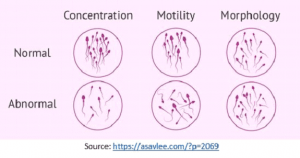Male Infertility Treatment in India
Do you want to experience the joy of becoming a father, but infertility is the obstruction?
Are you trying to conceive but fail due to male factor infertility issues?
Then, visit Bloom IVF and consult Dr. Hrishikesh Pai, one of the leading Gynaecologists in India.
Dr Hrishikesh Pai offers reliable and efficient male infertility treatment in India. He has fulfilled the dream of many couples with male factor infertility to become parents.
Dr. Pai is one of the top Gynecologists in India for treating male infertility issues. He provides the most suitable male infertility treatment by implementing the latest reproductive technologies like ICSI, IMSI, etc. Bloom IVF started ICSI first time in India in 1995 and IMSI in 2007. Bloom IVF has performed more than 300 IMSI cycles. Through these advanced reproductive technologies and other infertility diagnosis methods, we have provided positive results.
What is male infertility?
Male infertility is any health issue in men that refers to a male’s inability to cause pregnancy in a fertile female. Male infertility issue is the result of low sperm production, abnormal sperm function or blockages that prevent the delivery of sperm. Illnesses, injuries, chronic health problems, lifestyle choices and other factors can play a role in causing male infertility. Hence, male infertility treatment in India has high demand. In metro cities like Mumbai, people consult infertility specialist in Mumbai to resolve the male infertility problem.
CONTACT US FOR MORE INFORMATION OR BOOK AN APPOINTMENT
How do you know if your male partner has an infertility issue?
Look for the symptoms below:
- Swelling and pain in the genital region
- Low sex desire
- Trouble getting an erection
- Retrograde ejaculation
What are the causes of male infertility?
- Hormonal imbalance: Increase or decrease in the amount of any hormone responsible for sperm production can cause infertility.
- Stress: Increased stress hormones can reduce the levels of testosterone and in turn, decrease the sperm count.
- Chromosomal abnormalities: Males with Klinefelter syndrome have an extra ‘X’ chromosome (XXY) in their genetic make-up. Such men will not have enough sperm or no sperms in their testes.
- Genetic conditions: A low sperm counts due to specific genetic conditions such as an autoimmune disease where your body produces antibodies that attack your sperm.
- Obesity: Being overweight can reduce the levels of testosterone hormone, thus affecting sperm quality and count.
Blockage or obstruction: A block in the tubes that pass the ejaculate can prevent the delivery of the sperm. - Lifestyle habits: Excess smoking, particularly marijuana or hash smoking, has shown to reduce sperm count, sperm quality or damage to the sperm DNA. Recent studies have proved that the offspring of couples with the excessive smoking habit can have a higher risk of childhood cancers. Excess alcohol consumption, using recreational drugs, eating unhealthy food also contribute to infertility.
- Injury or infection: Any trauma to the testis or testicular infection can cause the testis to stop producing the sperms.
- Other reasons: Chemotherapy or uncontrolled diabetes can affect sperm generation and quality. Sometimes the cause of infertility remains explained.
How to diagnose male infertility?
Semen analysis:
It is a male fertility test that starts with a semen sample collection in a clean container. The male can masturbate and release the ejaculate completely. First few drops of the semen are very rich in sperms. Hence, you should carefully collect the semen and then give it for examination.
An average sperm count is around 15 million to 200 million per ml of the ejaculate.
Sperm count less than 15 million, we call oligospermia or low sperm count. Less than five million is severe oligospermia that means severely reduced sperm count.
Not only the count but we also have to check the sperm motility, morphology and viability as it plays a significant role. All three functional parameters together to call a good sperm analysis.
The morphology that is shape of the sperm head, or the sperm tail should be standard as it plays a vital role in attaching the egg. The sperm quality is examined under a high magnification microscope.
Analysis of hormonal levels:
In a few cases, there is not even a single sperm in the ejaculate, i.e. Azoospermia. In such cases, we do a hormone analysis of the males. We check the testosterone level, the FSH, LH, Thyroid, etc.
- Ultrasound: The third examination that you can do is an ultrasound of the testis. Ultrasound determines the structure and size of the testis.
- Genetic testing: In a few cases, we also recommend male genetic testing. One looks like a male, but sometimes there is an extra X in the genetic make-up. For example, as in males with Klinefelter syndrome have XXY. Such male will not have enough sperm or no sperms in their testes.
CONTACT US FOR MORE INFORMATION OR BOOK AN APPOINTMENT
What are the different male infertility treatments in India?
- Male factor infertility includes severe oligospermia, OATs(Oligoasthenoteratozoospermia) and Azoospermia. Dr. Hrishikesh Pai and his team can handle such cases very effeciently.
- If there is a palpable varicocele, we can correct it by microsurgery or laparoscopy. We prescribe gonadotrophins for Hypogonadotropic hypogonadism. Here, after the treatment, the sperms produced in the semen are frozen for future use with ICSI.
- If there is no reason found, we give the patient an empirical treatment such as clomiphene, carnitine, coenzyme q, as well as gonadotrophins. After treatment, if the sperm count is 5-10 million/ml, one can undergo 2 IUI cycles followed by ICSI. If the count is less than five mill /ml, it is best to go for ICSI directly.
- In instances of repeated ICSI failure or sperms with a very severe abnormality, one can go for IMSI.
- In case of sperm DNA fragmentation of more than 30 %, one can correct a palpable varicocele if present or give patient oral medication with antioxidants. If DNA fragmentation persists, it is better to do TESE ICSI.
Why choose Bloom IVF?
- Bloom IVF have a large IVF chain with ten full-fledged IVF centres across India.
- We have a highly acclaimed team of IVF specialists trained internationally. Our doctors have advanced expertise in treating repeated IVF failure patients. Our expert doctors have broad experience of treating over 25,000 patients.
- At Bloom IVF, we follow standardized protocols that have proven results. We have a track record of higher success rate (40-50% live birth rate) compared to the Western countries.
- We have a highly advanced laboratory equipped with HEPA filter using class 10,000 air handling units and latest IMSI, embryo scope, assisted laser hatching services and more.
- We at Bloom IVF also offer services like PGD/PGS, Advanced NGS (Next Generation Sequencing) system for PGD to diagnose genetic disorders.
- We have served international patients from across the world, including countries like USA, UK, Canada, Mauritius, Middle East, Norway, Spain, etc.


